Mayor Rahm Emanuel, Bank of America and JPMorgan Chase all have their own slice of downtown Chicago, but the grassroots occupation movement Occupy Chicago has yet to find a permanent home.
Since Occupy Chicago's attempt to start an encampment at a swathe of prominent Grant Park on Saturday ended with a mass civil disobedience in which 200 activists were arrested, the movement has been offered a meeting with Emanuel.
But organizers say that Emanuel's tactic does not aim to accommodate the protests but to diffuse them before Chicago becomes the central point of anticorporate anger when the North Atlantic Treaty Organization (NATO) and the G8 hold their summit in the city next year and Obama begins his re-election campaign out of Chicago.

“The Chicago Police Department and the city of Chicago itself are playing a different game than we are seeing around the rest of the country,” said Matthew Camp, an organizer with Occupy Chicago. “They are not trying to physically repress the movement, but instead, they are denying it the chance to exist as an occupation.”
Positions at Monday's general assembly on whether to accept Emanuel's offer were divided between demanding that Emanuel come to the protest site, sending representatives to his office and asking him to hold a general assembly in City Hall.
A motion was passed to issue a formal statement to Emanuel. His office did not respond to requests for comment on the current status of the offer.
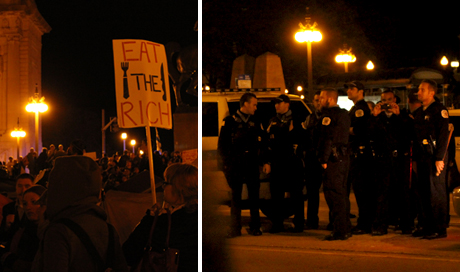
Twenty-six days since Occupy Chicago started, the movement maintains a picket 24 hours a day, seven days a week in front of the city's financial district, but activists say that starting an encampment is key to building solidarity among different groups and in keeping their resistance visible.
Camp, who calls himself “overeducated and underemployed,” said that if the protest were able to move to Grant Park, “thousands of people would be exposed to the occupation a day, and I think once it moves to a public space we will see a much broader level of participation.”
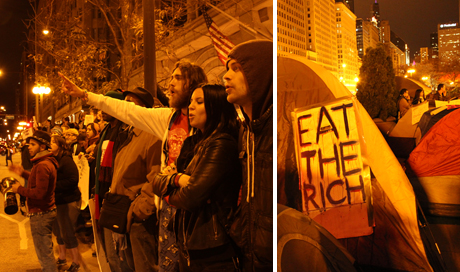
Chris Alvarez, 23, a military veteran who was medically discharged and had his benefits cut, spoke to Truthout as he secured a tent in Chicago's Grant Park among the more than 2,000-strong crowd on Saturday night.
“The strategy is pretty much to set up headquarters,” said Alvarez. “People are ready to take a stand.”

Cassie Bee said she was hoping that Saturday's encampment would come together because, “I was hoping I could have a place to sleep tonight.”
Bee, 22, a trans woman, said that her parents had kicked her out and, since graduating with a degree in geography and earth sciences in July, she had been unable to find a job.
“I would like to see more diversity in this,” said Bee, who recognized that, with her degree, things will be better for her in a couple of years, “but for a lot of people that won't be the case.”
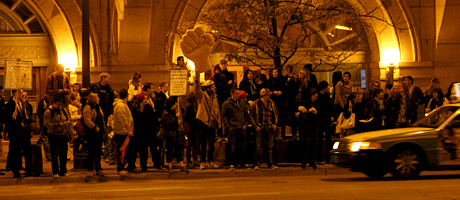
Occupy Chicago plans to attempt to set up an encampment again on Friday, but this time, they have new allies – Service Employees International Union (SEIU) will be bussing in its members, according to Camp, and the director of Jobs With Justice made a statement at Monday's general assembly offering the support of its members to help Occupy Chicago find a permanent home.
“We need to not only do this for one month, but we need to continue this fight,” said Matthew Scott, media director for the Chicago Anti-Eviction Campaign. “You can really feel the frustrations and hopes of people here. We're of the people and for the people.”
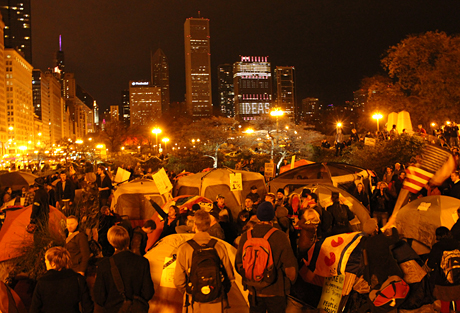






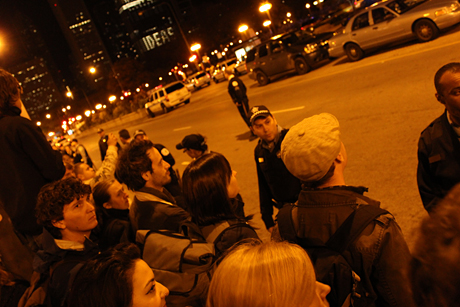

We have 10 days to raise $50,000 — we’re counting on your support!
For those who care about justice, liberation and even the very survival of our species, we must remember our power to take action.
We won’t pretend it’s the only thing you can or should do, but one small step is to pitch in to support Truthout — as one of the last remaining truly independent, nonprofit, reader-funded news platforms, your gift will help keep the facts flowing freely.
